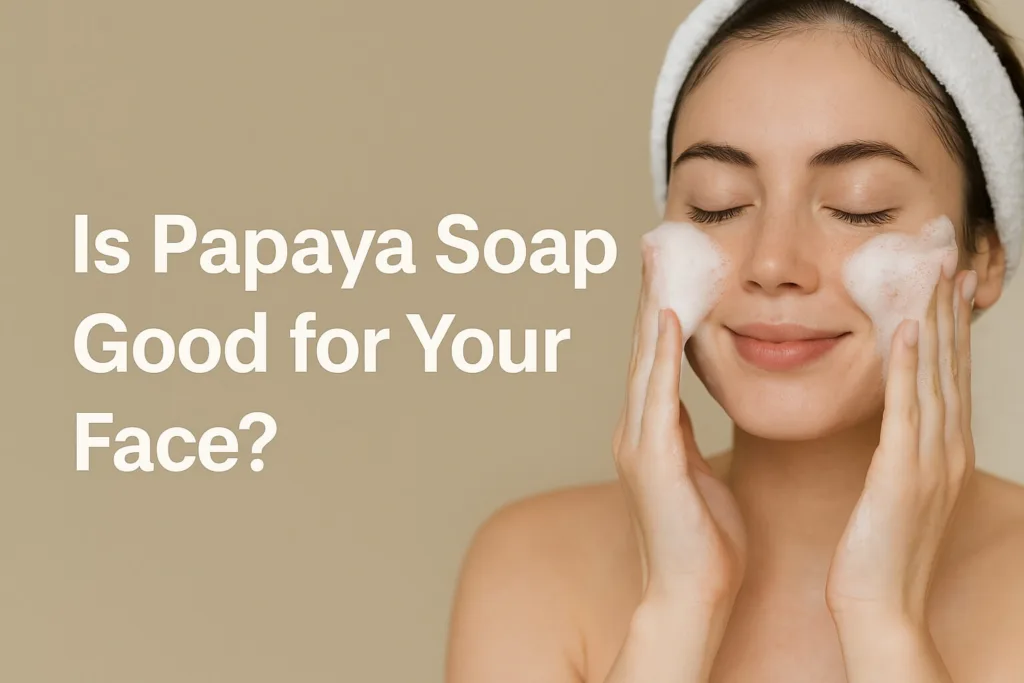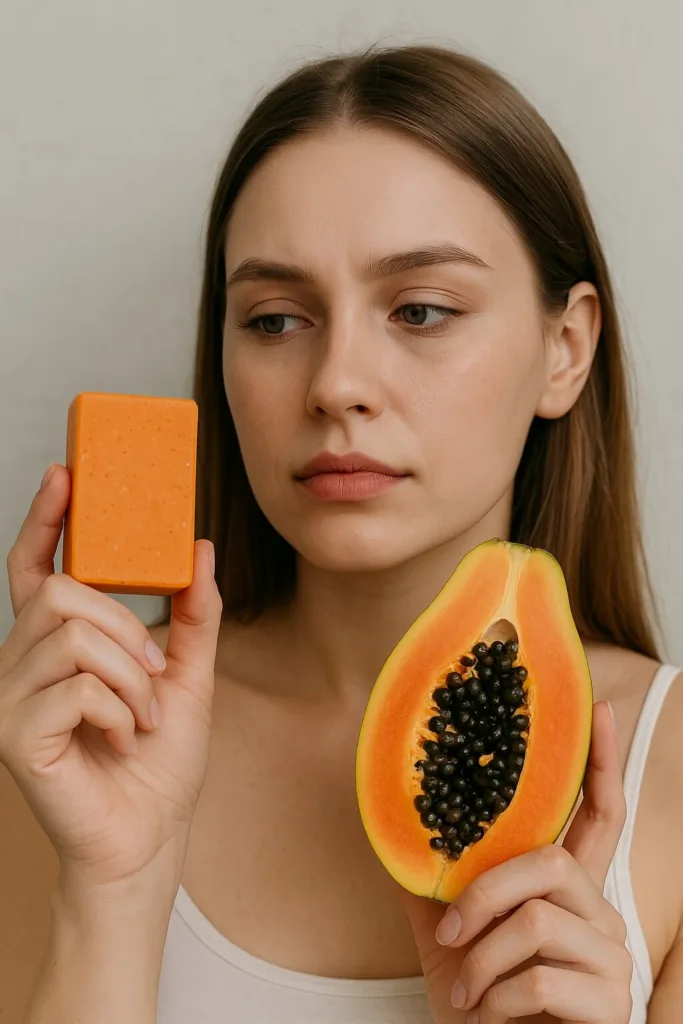Introduction: The Rising Debate Around Papaya Soap for Facial Care
In the ever – expanding universe of skincare, Papaya Soap has emerged as a product that has captured the attention of consumers worldwide. With social media platforms inundated with captivating before-and-after images touting the transformation of skin into a glowing canvas, and beauty influencers passionately endorsing its natural benefits, the query “Is Papaya Soap Good for Your Face?” has become a central topic of discussion among skincare enthusiasts. As more individuals are gravitating towards natural ingredients in their quest for effective skincare, Papaya Soap stands out with its alluring promises of gentle exfoliation, skin brightening, and deep cleansing. Discover how papaya soap benefits different skin types and embark on a journey with us as we explore the expert opinions of dermatologists, scientific studies, and real-life user experiences to determine the true worth of this fruit-based facial cleanser. The allure of Papaya Soap lies in its seemingly magical combination of natural origin and potential skincare benefits, but separating fact from fiction is essential to understand its actual impact on facial skin.
The intrigue surrounding Papaya Soap stems from its roots in nature. Derived from papayas, which are brimming with beneficial enzymes and vitamins, this soap has gained popularity as a potentially gentle yet effective addition to facial care regimens. However, like any skincare product, it is imperative to delve deeper and comprehend its true effects on the skin when pondering the question “Is Papaya Soap Good for Your Face?”. With so many conflicting opinions online, discerning the reality of “Is Papaya Soap Good for Your Face” requires a closer look at the science and evidence behind this popular product.

What Is Papaya Soap Made Of?
Papaya Soap is a carefully crafted product, with ripe papayas serving as the cornerstone of its formulation. At the heart of this soap lies papain, a proteolytic enzyme that possesses remarkable properties. Papain has the unique ability to break down proteins, and in the realm of skincare, it specifically targets the proteins that bind dead skin cells together. This makes it an exceptional natural exfoliant, setting Papaya Soap apart from many other cleansers on the market. Understanding these fundamental ingredients is crucial when attempting to evaluate “Is Papaya Soap Good for Your Face?”.
Papayas are not only rich in papain but also packed with vitamin C, a well – recognized antioxidant. Vitamin C plays a multi – faceted role in skin health. It stimulates collagen production, which is vital for maintaining skin elasticity and preventing the signs of aging. Additionally, it acts as a shield against free radical damage, which can be caused by factors such as UV radiation, pollution, and stress. By inhibiting melanin synthesis, vitamin C also contributes to a brighter complexion, reducing the appearance of dark spots and uneven skin tone. These ingredients work in harmony to address the question of “Is Papaya Soap Good for Your Face” by providing a range of skincare benefits.
Most formulations of this papaya incorporate natural oils such as coconut oil, olive oil, or shea butter. Coconut oil, for instance, is abundant in lauric acid, which exhibits antibacterial and antifungal properties. This makes it particularly beneficial for individuals with acne – prone skin, as it can help combat the bacteria that cause breakouts. Olive oil and shea butter, on the other hand, are excellent emollients. They provide deep hydration to the skin, leaving it soft, smooth, and supple. These oils, in combination with papain and vitamin C, work in harmony to cleanse, hydrate, and nourish the skin, contributing to answering the question “Is Papaya Soap Good for Your Face?”.
Glycerin, a natural byproduct of the saponification process (the process by which soap is made), is often retained in high-quality this papaya. As a humectant, glycerin has the ability to attract moisture from the air and draw it into the skin. This further enhances the soap’s hydrating capabilities, ensuring that the skin remains moisturized even after cleansing. Some Papaya Soap products may also include additional herbal extracts like aloe vera, chamomile, or tea tree oil. Aloe vera is renowned for its soothing properties, making it ideal for calming irritated skin. Chamomile has anti-inflammatory effects, which can reduce redness and inflammation, while tea tree oil is highly effective against acne-causing bacteria. Each of these ingredients plays a specific role in the overall effectiveness of Papaya Soap, and understanding them is key to determining if it is a suitable product for facial use. Learn what experts think about papaya soap for facial care to gain a more comprehensive understanding of how these ingredients work together.
How Does Papaya Soap Affect Facial Skin?
Exfoliation
The papain enzyme in Papaya Soap is the star player when it comes to exfoliation. Unlike physical exfoliants, which often rely on rough particles that can potentially damage the skin’s delicate surface, papain works at a molecular level in a gentle manner. It dissolves the “glue” that holds dead skin cells to the surface of the skin, allowing them to be effortlessly washed away during the cleansing process. This gentle exfoliation is a significant factor in determining if Papaya Soap is good for your face, as it helps to maintain a healthy skin barrier. By removing the layer of dead skin cells, papain reveals fresher, smoother skin underneath, and also aids in unclogging pores. This process promotes cell turnover, giving the skin a more youthful appearance. For those with sensitive skin, this gentle exfoliation method is a godsend, as it provides the benefits of exfoliation without the risk of irritation or damage that can be associated with harsher exfoliants. When considering “Is Papaya Soap Good for Your Face”, this gentle exfoliation mechanism is a key aspect to evaluate.
Pore Purification
As Papaya Soap exfoliates the skin, it simultaneously works to purify the pores. Over time, dead skin cells, excess sebum, and dirt can accumulate in the pores, leading to a dull complexion and an increased likelihood of breakouts. The papain enzyme’s ability to remove dead skin cells from the pore lining, combined with the cleansing action of the soap, helps to flush out these impurities. As a result, pores appear smaller and less noticeable, and the skin’s texture becomes more refined. This pore – purifying effect is an important consideration in the discussion of “Is Papaya Soap Good for Your Face?”, as clear pores are essential for maintaining healthy, blemish-free skin. Explore the pros and cons of using papaya soap on your face to further understand how this impacts your skincare routine.
Skin Brightening
The high vitamin C content in this papaya endows it with the potential to brighten the skin significantly. Vitamin C is a powerful antioxidant that inhibits the production of melanin, the pigment responsible for dark spots, hyperpigmentation, and uneven skin tone. By reducing melanin synthesis, Papaya Soap can help to fade existing dark spots, such as those caused by sun damage, acne scars, or aging. With regular use, it can also prevent new dark spots from forming, leading to a more even – toned and radiant complexion. This skin – brightening effect is highly sought after by many consumers, making it a key aspect when evaluating whether Papaya Soap is good for the face. The impact of this brightening effect on the question “Is Papaya Soap Good for Your Face” cannot be overstated, especially for those aiming to achieve a more luminous complexion.
Antibacterial and Anti – Inflammatory Effects
Ingredients like coconut oil and tea tree oil (in certain formulations) in Papaya Soap possess potent antibacterial properties. They are effective in combating bacteria such as Propionibacterium acnes, which is a common culprit behind acne breakouts. The anti – inflammatory properties of ingredients like chamomile and aloe vera further enhance the soap’s ability to soothe irritated skin, reduce redness, and calm inflammation associated with acne or other skin irritations. For individuals with acne – prone or sensitive skin, these antibacterial and anti – inflammatory benefits are essential factors to consider when assessing “Is Papaya Soap Good for Your Face?”.
Dermatologist Opinions on Using Papaya Soap on Your Face
Dermatologists have a diverse range of opinions regarding Papaya Soap, but many recognize its potential benefits. According to a detailed report on Medical News Today, Dr. Emily Smith, a highly respected dermatologist, states, “The papain enzyme in Papaya Soap can be an excellent alternative to harsh chemical exfoliants, especially for individuals with sensitive skin. Its gentle exfoliation properties are crucial for maintaining a healthy skin barrier and promoting cell turnover, which are essential for overall skin health.” These expert insights offer valuable perspectives on “Is Papaya Soap Good for Your Face?”, highlighting the soap’s potential as a gentle yet effective skincare option.
However, Dr. Smith also issues a word of caution: “While Papaya Soap has its merits, it’s important to note that not all formulations are created equal. Some may contain additional ingredients that could potentially trigger allergic reactions or irritate the skin, particularly in individuals with pre-existing skin sensitivities or allergies.” Another dermatologist, Dr. David Kim, emphasizes the significance of considering one’s skin type when using Papaya Soap. He explains in an interview with Byrdie, “For those with oily or acne – prone skin, the antibacterial properties of ingredients like coconut oil and tea tree oil in Papaya Soap can be extremely beneficial. However, individuals with dry skin need to ensure that the soap they choose contains sufficient hydrating ingredients to prevent further dryness and potential irritation.” These expert viewpoints provide a balanced perspective on “Is Papaya Soap Good for Your Face”, helping consumers make more informed decisions.
Overall, dermatologists concur that when used correctly and with a formulation suitable for one’s skin type, Papaya Soap can be a valuable addition to facial skincare routines. Their guidance underscores the importance of proper usage and product selection when determining if Papaya Soap is good for the face. To explore more about what experts think and make an informed decision, Explore the pros and cons of using papaya soap on your face.

Benefits of Using Papaya Soap for Facial Care
Gentle Exfoliation for All Skin Types
One of the most notable benefits of Papaya Soap is its gentle exfoliating nature. As previously discussed, the papain enzyme offers a milder form of exfoliation compared to many other products available in the market. This makes it suitable for a wide spectrum of skin types, including sensitive, dry, oily, and combination skin. For those with sensitive skin, traditional exfoliants can often cause redness, irritation, and damage to the skin barrier. Papaya Soap, on the other hand, provides a gentle yet effective exfoliation experience, allowing for regular exfoliation without these adverse effects. This gentle exfoliation helps to keep the skin smooth, healthy, and free from dead skin cell buildup, which is a major advantage when considering “Is Papaya Soap Good for Your Face?”.
Improved Skin Texture and Tone
Regular use of Papaya Soap can lead to a remarkable improvement in skin texture and tone. By effectively removing dead skin cells and unclogging pores, it reveals a smoother and more refined skin surface. The skin – brightening properties of vitamin C work in tandem with the exfoliating action to even out skin tone, reducing the appearance of dark spots, hyperpigmentation, and uneven patches. Over time, users may notice that their skin looks more radiant, youthful, and healthy. These improvements in skin texture and tone are significant factors that contribute to the positive aspects of “Is Papaya Soap Good for Your Face?”.
Acne Management
For individuals who are constantly battling acne, Papaya Soap can be a game – changing addition to their skincare routine. The combination of antibacterial ingredients and the exfoliating action of papain works synergistically to combat acne – causing bacteria and prevent breakouts. By keeping pores clear of debris and excess sebum, and by reducing inflammation, Papaya Soap helps to control existing acne and prevent new pimples from forming. Many users with acne – prone skin have reported a significant reduction in the number and severity of breakouts after incorporating Papaya Soap into their daily skincare regimen. Its effectiveness in acne management is a key factor for those who are wondering “Is Papaya Soap Good for Your Face?”.
Hydration and Moisture Retention
Despite its powerful cleansing and exfoliating properties, Papaya Soap does not strip the skin of its natural moisture. The inclusion of natural oils such as coconut oil, olive oil, and shea butter, along with glycerin, ensures that the skin remains hydrated during and after the cleansing process. These hydrating ingredients form a protective barrier on the skin, locking in moisture and preventing dryness. This is particularly important for maintaining a healthy skin barrier, which helps to protect the skin from external aggressors and prevent moisture loss. The hydration and moisture – retaining benefits of Papaya Soap are crucial when evaluating if it is good for the face, especially for those with dry or dehydrated skin. Find out if papaya soap is the right skincare solution for you based on these benefits and your skin’s needs.
Potential Risks and Who Should Avoid It
Allergic Reactions
Although Papaya Soap is formulated with natural ingredients, it is not without the risk of allergic reactions. Some individuals may be allergic to papaya or other components present in the soap. Allergic reactions can vary in severity, ranging from mild symptoms such as itching, redness, and rashes to more severe manifestations like swelling, blistering, and even difficulty breathing in rare cases. It is of utmost importance to perform a patch test before using Papaya Soap on your face. This involves applying a small amount of the soap to a discreet area of your skin, such as the inside of your wrist, and waiting for 24 – 48 hours to observe any adverse reactions. Considering these potential allergic risks is essential when answering the question “Is Papaya Soap Good for Your Face?”.
Sensitivity and Irritation
Even if you are not allergic to the ingredients in Papaya Soap, it may still cause sensitivity or irritation, especially if you have very sensitive or reactive skin. The exfoliating action of papain, although gentle compared to some other exfoliants, can still be too much for certain individuals. This can result in redness, dryness, a stinging sensation, or increased skin sensitivity. If you experience any of these symptoms, it is advisable to discontinue use or reduce the frequency of use. These potential issues need to be carefully considered when determining “Is Papaya Soap Good for Your Face?”.
Dry Skin Concerns
While Papaya Soap contains hydrating ingredients, some formulations may not be sufficient to meet the needs of individuals with extremely dry skin. The exfoliating action of the soap can also temporarily increase moisture loss from the skin, leaving it feeling dry and tight. Those with dry skin should look for Papaya Soap products that are specifically formulated for dry skin types. These formulations typically contain higher concentrations of emollients and humectants to provide enhanced hydration. For individuals with dry skin, these concerns play a significant role in determining whether Papaya Soap is a suitable option for their facial skincare routine, impacting the answer to “Is Papaya Soap Good for Your Face?”. Is papaya soap effective for facial cleansing and brightening? Explore further to see if it aligns with your skincare goals despite these concerns.

User Experiences: Before and After Using Papaya Soap
Sarah’s Story: From Dull to Radiant Skin
Sarah, a 25 – year – old office worker, had been struggling with dull, uneven skin tone for years. She had tried numerous skincare products, but none seemed to deliver the results she desired. After coming across positive reviews of Papaya Soap online, she decided to give it a try. “I was skeptical at first,” Sarah admits, “but after using the soap for about a month, I started to notice a significant difference. My skin looked brighter, and the dark spots on my cheeks, which had been bothering me for so long, started to fade. The best part was that it didn’t irritate my sensitive skin at all. I’ve now been using it for three months, and my skin has never looked better. It’s like a whole new me!” Sarah’s experience provides real – life evidence that is highly relevant to the question “Is Papaya Soap Good for Your Face?”, showcasing the potential of the soap to transform dull skin into a radiant complexion. Her story serves as a practical example for those still questioning “Is Papaya Soap Good for Your Face” and considering giving it a try.
Mark’s Battle with Acne
Mark, a college student with acne – prone skin, had been on a never – ending quest to find a product that could effectively control his breakouts. He had tried countless over – the – counter treatments and even some prescription medications, but his acne persisted. Frustrated, he decided to try Papaya Soap on the recommendation of a friend. “I was constantly dealing with painful breakouts, and my skin felt oily and congested all the time,” Mark recalls. “But after switching to Papaya Soap, I noticed a significant change. My breakouts became less frequent and less severe. The soap seemed to clear my pores and control the oil production. My skin texture also improved, and it felt smoother. I’m so glad I gave it a chance!” Mark’s story offers practical insights into how Papaya Soap can be beneficial for those with acne – prone skin, providing valuable information for those who are wondering “Is Papaya Soap Good for Your Face?”.
Is Papaya Soap Good for Your Face? (Summary Verdict from Experts)
In summary, the consensus among dermatologists is that Papaya Soap can be a beneficial addition to facial skincare routines when used appropriately. Its gentle